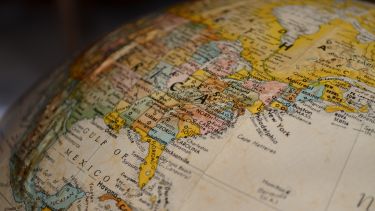International Relations
The research group aims to be an inclusive and interdisciplinary place for open discussion and collaboration within the study of IR.
Our Expertise
Our research group has a range of expertise including:
- Torture
- Human rights
- Middle Eastern politics
- Sexual and gendered violence
- Asylum and migration
- Creative research methods
- Decolonial thought
- Everyday practices and norms in the international system
- Sexual and gendered violence
- Terrorism
- Global politics of health
- Postcolonial, feminist and Queer theory
- Political Violence
- Disaster relief

Our Research
The International Relations Research Group is interested in a wide variety of cutting edge and topical issues. The group is pluralistic and interdisciplinary in that members adopt a wide range of perspectives from feminist and decolonial thought to historical sociology, and constructivism.
We use a diverse array of methods including participatory photo and video projects, archival research, and ethnography. Our members are interested in exploring creative, discursive, and visual methods, and many have experience with Participatory Action Research.
Much of what we do is 'critical' and aims to challenge and confront modes of power, marginalising norms, and dominant discourses. To do this our members draw on a wide range of critical approaches, especially those that seek to decolonise and deconstruct international politics. We also aim to connect our work with the ‘real world’ to ensure that our research is impacting and engaging with current political issues. Our member’s work has been key in shaping discussions on the UN’s Women Peace and Security agenda, masculinities and violence, the use of drones and surveillance, critical terrorism and military studies, and disaster relief and resilience.
Our Projects
Droned Life
Data, Narrative, and the Aesthetics of Worldmaking
This project examines drones’ ongoing implications for socio-cultural life through concepts of imaginaries, aesthetics, and worldmaking, and their use in military and civilian realms through four narrative, worldmaking forms—literature, film, the visual arts, and game design.
Joanna Tidy
2023 - 2027
UKRI
Counter-Terrorism in/by the community
Impacts and challenges
This project aims to conduct an ethnographic study of charities and community-based organisations that have received funding from the UK Home Office to conduct counter-terrorism work, moving away from state-centric security policies and putting forward an alternative understanding of community-led counter-terrorism initiatives.
Amna Kaleem
2023 - 2026
Leverhulme Early Career Fellowship
The impact of federalisation on Nepal's health system
A longitudinal analysis
Funded by the Medical Research Council, Economic & Social Research Council, Foreign Commonwealth & Development Office and Welcome Trust via the Health Systems Research Initiative.
Simon Rushton
2020 - 2024
What do Survivors Want?
A Victim-Centred Approach to Justice for Conflict Related Human Rights Abuses.
This project seeks to redefine justice based on the perceptions and understandings of victim/survivors. We have built a new victim-centred definition of justice, and a framework for justice that sets out new ways of delivering justice.
Helen Louise Turton
2021 - 2024


